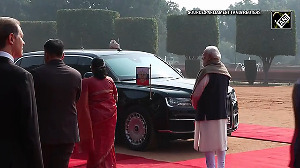Warning that the process of global economic recovery was "still fragile and uneven" though the "critical phase" was over, Prime Minister Manmohan Singh has pitched for greater focus on investments in infrastructure and inclusive growth to create new sources of growth.
Addressing the 2nd India-Brazil-South Africa (IBSA) Summit in Brasilia on Thursday, he said the grouping of leading developing economies must speak against the protectionist policies, "which are only shortsighted and self-defeating in the long run".
"IBSA can contribute to the shaping of the global agenda and highlighting the issues of concern to developing countries. We are united in our objective to ensure a fair and equitable international order," Dr Singh told the Summit also attended by Brazilian President Lula Da Silva and South African President Jacob Zuma.
He noted that the "critical phase of the global economic crisis is behind us, but the process of recovery is still fragile and uneven."
Underlining that the world must ensure that "we do not repeat the mistakes of the past", the prime minister said for the global economic recovery to be sustainable, it must be anchored in the real economy.
"The financial sector and international capital flows should contribute to economic growth rather than encourage speculation and volatility in the international system," Singh said.
Pitching for creation of new sources of growth, he emphasised, "our focus should be on greater investments in infrastructure, human capital, education and inclusive growth.""We are increasingly consulting each other on international issues," Singh noted.
Describing food security as an important goal for all the member countries of IBSA, he said the Summit would be adopting documents on a social development strategy and future agriculture cooperation within the IBSA framework.
He also underlined the need for IBSA to coordinate its positions in the G-20 and continue to pursue the early conclusion of the Doha round of trade negotiations "because a fair and rule based multilateral trading system is in our interest".
IBSA countries have been in the forefront of demands for greater market access to the developed markets, he said, adding "We must speak out against protectionist policies which are only short-sighted and self-defeating in the long run."
Dr Singh also stressed the "urgent need" for reform of the United Nations, including the Security Council, by making it more democratic and representative, saying the "systems of global governance have not kept pace with the changing realities of the world."
He saw the commencement of text-based negotiations in the United Nations in April is a positive development and said it has been possible due to the efforts of the G-4 (comprising India, Brazil, Germany and Japan) and South Africa.
Dr Singh said there has been considerable progress in the areas of science and technology and energy cooperation.
"We have expanded our cooperation to ocean research, space science, and the Antarctica. The three countries have participated in a joint naval exercise, IBSAMAR," he said and added that the second exercise will take place in South Africa later this year.
Under the IBSA Trust Fund, the three countries are committed to assisting other developing countries through development projects. This is a novel concept of South-South Cooperation, the prime minister said.
He also said the three countries have decided to expedite negotiations on India-SACU-Mercosur trade arrangement.
IBSA can contribute to the shaping of the global agenda and highlighting the issues of concern to developing countries. "We are united in our objective to ensure a fair and equitable international order," he said.





